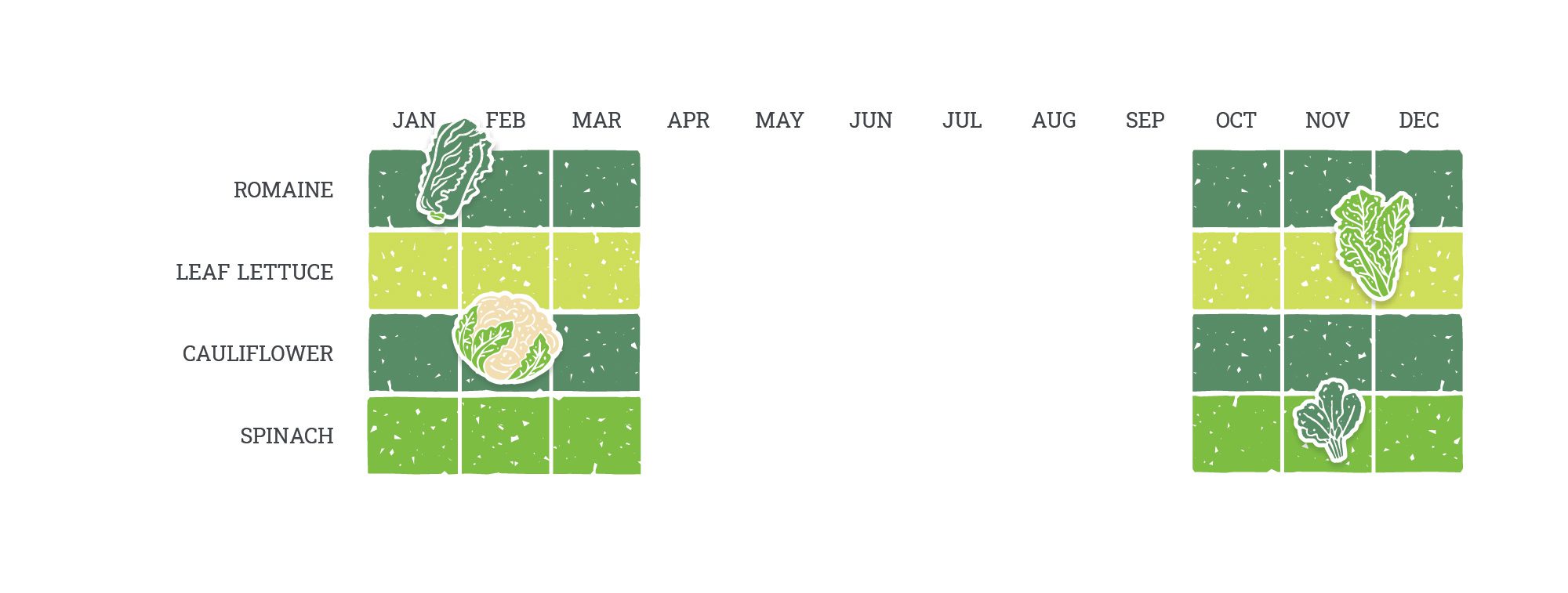
Our Romaine Lettuce stands out with its dark green, flavorful leaves, offering a crisp and crunchy texture that has made it a favorite in Caesar salads and beyond. Its versatility shines when paired with a diverse range of ingredients like roasted red pepper, citrus, avocado, apples, pears, grilled meats, bacon, and cheeses.
Beyond its culinary appeal, Romaine Lettuce is an excellent source of dietary fiber, vitamins, and minerals, making it a nutritious choice for a variety of dishes.
Romaine Hearts, the tender center leaves of the romaine lettuce head, are known for their paler color and sweeter taste. These crunchy, thick-walled leaves are perfect for adding a fresh twist to mixed green or Caesar salads. For a unique culinary experience, try grilling them with a brush of vinaigrette for a warm salad or a delightful side dish.
Our Romaine Hearts are not just about taste; they are also packed with nutritional value, making them a healthy addition to any meal.
Green Leaf Lettuce, a variety of loose-leaf lettuce, is celebrated for its delicate flavor and crispy texture. This versatile green can enhance any dish, from salads to wraps, and serves as a perfect garnish or a crisp addition to sandwiches and hamburgers.
Not only does it bring a fresh element to meals, but it also offers a nutritional boost, being a good source of essential vitamins and folate.
Red Leaf Lettuce, with its distinctive dark red or purple-tipped leaves, offers a similar texture to green leaf lettuce but with an added visual appeal. This form of loose-leaf lettuce brings extra crunch and flavor to a variety of dishes, from vibrant salads to wraps, sandwiches, and as a garnish for meats.
Beyond its culinary versatility, Red Leaf Lettuce is nutrient-dense, providing numerous health benefits to any meal.
Spinach, a celebrated dark leafy green, is a staple in both fresh and cooked forms. Its popularity in salads comes from its ability to complement a wide range of ingredients, including spring vegetables, citrus, berries, eggs, nuts, bacon, pasta, and fresh cheeses.
Beyond its culinary flexibility, Spinach stands out as a nutritional powerhouse, being an excellent source of antioxidants, protein, fiber, vitamins A and C, calcium, and iron.
Napa Cabbage, characterized by its large, elongated, and densely packed head, offers a crisp texture and a subtly sweet, mild flavor. This versatility makes it a favorite for shredding into slaws or green salads, and it’s perfect for stuffing into dumplings, fresh spring rolls, and steamed buns.
Nutritionally, Napa Cabbage is an excellent choice, rich in calcium, vitamins, and antioxidants, making it a healthful addition to a variety of dishes.
Cauliflower, with its tightly bound florets forming a dense head similar to broccoli, boasts a soft and crumbly texture. Its mild flavor, accented with subtle nutty and sweet nuances, makes it incredibly versatile in the kitchen. Whether eaten raw, cooked, roasted, grilled, transformed into a pizza crust, or mashed as a healthier alternative to mashed potatoes, Cauliflower adapts beautifully to a variety of culinary uses.
Nutritionally, it’s a smart choice, high in both fiber and vitamin C, enhancing any meal with its health benefits.
Broccoli has large, dense flower heads, usually dark green, arranged in a tree-like structure branching out from a thick stalk that is usually light green. Broccoli is commonly eaten raw or cooked, with an earthy flavor that’s ever-so-slightly bitter when raw. The cooking process softens the florets, creating a tender texture and a milder, slightly sweeter flavor. Broccoli is a beloved sautéed side dish with lemon and olive oil, faithful team player to quick stir-fries, and virtuous add-in to any number of cheesy pasta dishes.
Broccoli is renowned for its rich nutrient profile, including vitamins, minerals, fiber, and beneficial plant compounds.
Brussels Sprouts, resembling miniature cabbages, are small and compact with a bright green hue. Their earthy, subtly sweet, and slightly bitter taste when raw transforms into mellow, savory, sweet, and nutty undertones upon cooking. These little powerhouses are incredibly adaptable, perfect for shredding into slaws or salads, or delicious when braised, lightly steamed, or sautéed.
Nutritionally, Brussels Sprouts are a smart addition to any diet, being a good source of dietary fiber, vitamins, and potassium.
Green Onions, distinct with their long green stalks, small white bulbs, and frilly roots, are a unique variety that adds both flavor and texture to a myriad of recipes. Versatile in their use, the entire onion, including the top, can be sliced and used raw in salads, as a garnish, or cooked in stir-fries, offering a subtle yet impactful flavor.
These onions are not just about taste; they are also nutritionally beneficial, being an excellent source of beta-carotene, folate, vitamins, and calcium.
Daikon, a long and tubular root vegetable, is renowned for its crunchy texture and a unique flavor profile that’s mild, semi-sweet, and peppery with a tangy edge when raw. Upon cooking, it softens, resembling the consistency of a potato, and takes on a more neutral flavor. This versatility makes Daikon a perfect addition to salads, coleslaw, spring rolls, or even pickled with other vegetables. Beyond its culinary uses,
Daikon radishes are nutritionally valuable, being an excellent source of vitamin C and potassium.
